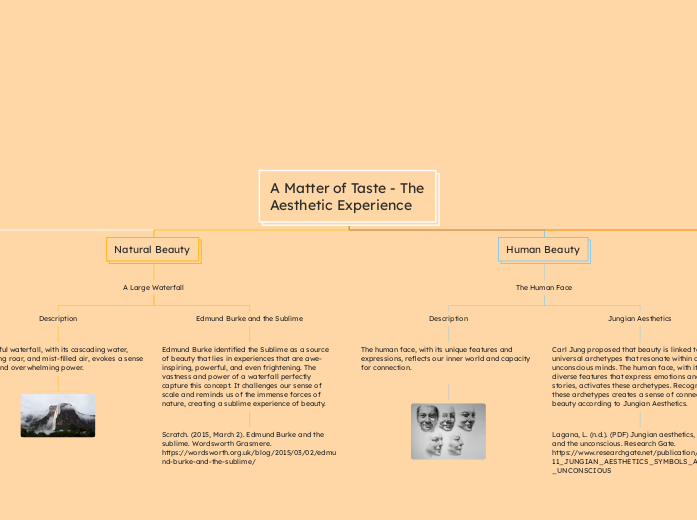A Matter of Taste - The Aesthetic Experience
Everyday Object
A Mundane Tea Cup
Wu Wei
Wu Wei, a Taoist concept, emphasizes effortless action and harmony with nature. The teacup, in its perfect balance of form and function, achieves this harmony. It allows us to appreciate the act of drinking tea without unnecessary complication, reflecting the beauty of effortless perfection in Wu Wei.
Zhu, R. (n.d.). (PDF) http://www.tandfonline.com/doi/abs/10.1080/009140390909763. Research Gate. https://www.researchgate.net/publication/232173635_httpwwwtandfonlinecomdoiabs101080009140390909763
A simple, well-crafted teacup, designed for holding and enjoying tea, embodies effortless functionality.
Human Beauty
The Human Face
Jungian Aesthetics
Carl Jung proposed that beauty is linked to universal archetypes that resonate within our unconscious minds. The human face, with its diverse features that express emotions and tell stories, activates these archetypes. Recognizing these archetypes creates a sense of connection and beauty according to Jungian Aesthetics.
Lagana, L. (n.d.). (PDF) Jungian aesthetics, symbols and the unconscious. Research Gate. https://www.researchgate.net/publication/330831711_JUNGIAN_AESTHETICS_SYMBOLS_AND_THE_UNCONSCIOUS
The human face, with its unique features and expressions, reflects our inner world and capacity for connection.
Natural Beauty
A Large Waterfall
Edmund Burke and the Sublime
Edmund Burke identified the Sublime as a source of beauty that lies in experiences that are awe-inspiring, powerful, and even frightening. The vastness and power of a waterfall perfectly capture this concept. It challenges our sense of scale and reminds us of the immense forces of nature, creating a sublime experience of beauty.
Scratch. (2015, March 2). Edmund Burke and the sublime. Wordsworth Grasmere. https://wordsworth.org.uk/blog/2015/03/02/edmund-burke-and-the-sublime/
A powerful waterfall, with its cascading water, thundering roar, and mist-filled air, evokes a sense of awe and overwhelming power.
Fine Art
The Taj Mahal
Aristole/Plato's Forms
Aristotle and Plato believed in ideal Forms, perfect representations of concepts that exist outside the physical world. The Taj Mahal, with its symmetrical layout, flawless craftsmanship, and embodiment of love and devotion, strives to capture these ideal Forms in physical form. Its beauty lies in its approach to perfection.
Ruskin, J. (n.d.). Classical greek aesthetics – Plato and Aristotle. Classical Greek Aesthetics – Plato and Aristotle. https://corebaby.org/wp-content/uploads/2015/11/Classical-Greek-Aestehetics-Plato-Aristotle.pdf
Description
The Taj Mahal, a white marble mausoleum, is known for its perfect proportions, intricate details, and harmonious design.









